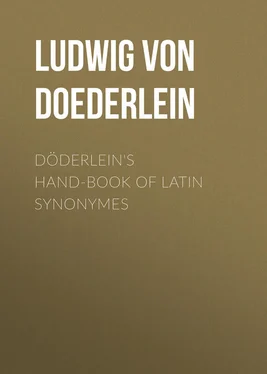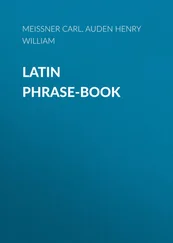Ludwig Doederlein - Döderlein's Hand-book of Latin Synonymes
Здесь есть возможность читать онлайн «Ludwig Doederlein - Döderlein's Hand-book of Latin Synonymes» — ознакомительный отрывок электронной книги совершенно бесплатно, а после прочтения отрывка купить полную версию. В некоторых случаях можно слушать аудио, скачать через торрент в формате fb2 и присутствует краткое содержание. Издательство: Иностранный паблик, Жанр: Языкознание, foreign_antique, foreign_prose, на английском языке. Описание произведения, (предисловие) а так же отзывы посетителей доступны на портале библиотеки ЛибКат.
- Название:Döderlein's Hand-book of Latin Synonymes
- Автор:
- Издательство:Иностранный паблик
- Жанр:
- Год:неизвестен
- ISBN:нет данных
- Рейтинг книги:3 / 5. Голосов: 1
-
Избранное:Добавить в избранное
- Отзывы:
-
Ваша оценка:
- 60
- 1
- 2
- 3
- 4
- 5
Döderlein's Hand-book of Latin Synonymes: краткое содержание, описание и аннотация
Предлагаем к чтению аннотацию, описание, краткое содержание или предисловие (зависит от того, что написал сам автор книги «Döderlein's Hand-book of Latin Synonymes»). Если вы не нашли необходимую информацию о книге — напишите в комментариях, мы постараемся отыскать её.
Döderlein's Hand-book of Latin Synonymes — читать онлайн ознакомительный отрывок
Ниже представлен текст книги, разбитый по страницам. Система сохранения места последней прочитанной страницы, позволяет с удобством читать онлайн бесплатно книгу «Döderlein's Hand-book of Latin Synonymes», без необходимости каждый раз заново искать на чём Вы остановились. Поставьте закладку, и сможете в любой момент перейти на страницу, на которой закончили чтение.
Интервал:
Закладка:
Ludwig von Doederlein
Döderlein's Hand-book of Latin Synonymes
INTRODUCTION TO THE AMERICAN EDITION
Dr. Ludwig Döderlein, the author of this work, was born in 1791, and became Professor in the University of Erlangen. He is an eminent philologist, and the author of several valuable philological works. The most important of these are: “The Formation of Latin Words;” “A Homeric Glossary;” “Handbook of Latin Etymology;” “Latin Synonymes and Etymologies,” in six volumes; on this he labored more than twelve years, the first volume appearing in 1826, the last in 1828. From this latter work, the volume here presented was prepared by the author, and first published in 1840. After a familiarity of several years with most of the best manuals on Latin Synonymes, we find this superior to any of them, and better adapted to the wants of the student. It shows an intimate and comprehensive acquaintance with the language, and a nice discrimination between the significations of words having a greater or less similarity of meaning. The distinctions are generally well founded, and clearly stated. While at times the distinction may seem to be too refined and subtle, careful observation and more extended study will usually correct such an impression. The difference between related words may proceed from a variety of sources. It may be that of genus and species; or it may be historical, one being used at one time and the other at a different one; or one is abstract, the other concrete; one is literal, the other figurative; one is the more common expression, the other the more elegant; one is a prose word, the other poetical; one belongs to one kind of poetry, and the other to another. The difference also consists in the point of view which the writer takes. Quies is rest; requies also is rest; but the latter word shows that the writer has in mind a previous state of unrest . There are other differences also growing out of the essential nature of the words.
The advantages of the study of synonymes in a classical course, are too great to be neglected. A knowledge of them gives to the student a fulness and precision of his author’s meaning otherwise unattainable. The point of a sentence often turns upon a delicate shade of thought conveyed by a particular word, which another of similar signification would not give; if this delicate shade is not appreciated, the writer’s thought is either misapprehended, or but imperfectly understood.
Again, the habit of observing the proper use of words related to each other in meaning, as whether one is generic, and the other specific, one abstract, the other concrete, one literal, the other figurative, or whatever be the ground and nature of the difference, is one of the essential benefits of classical study. The whole process of such study, when rightly conducted, is that of “arbitrating between conflicting probabilities;” and the closest power of arbitration is often requisite in determining the particular idea conveyed by related words. Or, if the distinctions are drawn out, as they are in a treatise on synonymes, the mind of the student is trained to close and discriminating observation, in being required to note and fix these distinctions, and to give a definite form to them in his own mind, and to express them in his own language.
Besides the more direct advantages resulting from the study of synonymes, an increased interest will thereby be given to classical studies There is a natural fondness in the youthful mind for the process of comparison, for tracing resemblances and differences. This element should not be neglected when it can be turned to so good account. It will help to relieve the tedium and barrenness of classical study, as too often conducted, and to give some living features to languages which are too generally looked upon as “dead.”
The meaning of a particular word is often given more distinctly by stating its opposite. The relation, or shade of thought, which cannot be conveyed fully by a direct definition, nor perhaps, indeed, by words at all, is made clear and distinct by showing to what it is opposed. This valuable means of elucidation, the author has used with great success in this work.
While the author has “omitted all detail in the treatment of Greek synonymes” in this compend, he has very wisely sought out the nearest corresponding Greek expression, and placed it with the Latin word to be explained. Thus the Greek word, to the more advanced scholar, will often throw light upon the Latin, and the Latin in turn upon the Greek. In this way the work is indirectly valuable in elucidating Greek synonymes.
The present edition of this work is reprinted from the second London edition, which is essentially the same as the first, with a few corrections and improvements.
S. H. T. Andover, January, 1858.THE AUTHOR’S PREFACE
The wish has been expressed to me from different quarters, and particularly by several respectable schoolmasters, to see the essential results of my larger work on Latin Synonymes and Etymologies compressed into a Hand-book. Although within the twelve years since I began to work at the long-neglected study of Latin Synonymes, the market has been almost glutted with works of the same sort, in the form of hand-books, by Habicht, Ramshorn, Jentzen, and Schmalfeld, I have not, on that acount, the least hesitation in complying with the wish expressed to me, by publishing the present Abridgment; for, in asserting that my method and the arrangement of my materials are totally distinct from what have been adopted by those deserving authors, I trust that I am neither extolling myself, nor underrating them. The Abridgment which I here submit to the Public contains, I hope, all that is essential in my larger work; – to effect which object I have omitted certain things of less direct importance; namely, —
First, – All etymological deductions. Not wishing, however, entirely to renounce my principle of associating the etymology with the synonyme, I have inserted it between parentheses, whenever it was not either so obvious as to make the insertion unnecessary, or so far-fetched as to make the etymology doubtful. Many instances of this sort will and must, especially to him who is not conversant with etymological researches, appear singularly uncouth; but it would have led me too far to refer, in every instance, to the principles established in the Treatise on the Formation of Latin Words, which I have subjoined to my larger work as a Supplement. I must, therefore, entreat those readers and critics into whose hands my treatise has not fallen, to ignore (if I may use a law term) the words included between parentheses, or to suspend their verdict concerning them.
Secondly, – I have omitted all parallel passages, and such as have an affinity with each other, without possessing any stringent force as proofs. On the other hand, I have given at length those passages in the classics in which the ancients, in the course of speech, and not by means of grammatical reflections, have introduced synonymes in contrast with each other, and thus taught their differences; and where such passages were wanting, I have frequently brought into juxta-position several passages from one and the same author, in which he seems to have indicated some peculiar force in a particular expression.
Thirdly, – I have omitted all critical and exegetical discussions. The more scientific form of my larger work not only afforded me the opportunity, but imposed the obligation of entering upon such discussions; but in the present Abridgment I have thought it best, except in a very few cases, to omit them altogether.
Fourthly, – I have omitted all detail in the treatment of the Greek synonymes. Nevertheless, I have thought it of essential importance to search for the nearest corresponding expression, both in the Greek and German languages, and place them by the side of the Latin synonyme; and at the same time to ascertain, and make intuitive, as it were, the precise meaning and extent of the Latin expression, by the introduction of such words as are strictly in opposition to it.
Читать дальшеИнтервал:
Закладка:
Похожие книги на «Döderlein's Hand-book of Latin Synonymes»
Представляем Вашему вниманию похожие книги на «Döderlein's Hand-book of Latin Synonymes» списком для выбора. Мы отобрали схожую по названию и смыслу литературу в надежде предоставить читателям больше вариантов отыскать новые, интересные, ещё непрочитанные произведения.
Обсуждение, отзывы о книге «Döderlein's Hand-book of Latin Synonymes» и просто собственные мнения читателей. Оставьте ваши комментарии, напишите, что Вы думаете о произведении, его смысле или главных героях. Укажите что конкретно понравилось, а что нет, и почему Вы так считаете.












